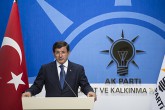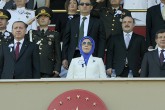The political situation in Turkey since the June 7 elections has been a process that many Turkish people have forgotten since the Justice and Development Party (AK Party) came to power in the November 2002 elections. In the history of Turkish democracy coalition formation has always been challenging and time consuming. The governments that were formed after these challenging negotiations seldom brought any improvement to the lives of the Turkish people and more frequently had paved the way for other actors to take the role of running the affairs of the state.
The coalition formation process ended with the failure of the political parties to form a coalition government and another election process has just begun. Voting behavior in this coming election will be determined by several factors. In addition to the frequently mentioned issue of PKK attacks and the situation in the southeast, the electorate will also pay attention to the debates among political campaigns about the process after the June elections and the economy in the country. In both instances voters will try to understand those responsible for the current situation.
The first of these aspects will be the economy. Although it was less appreciated and discussed than other issues after the June elections, the economy has been one of the most significant factors affecting votes for the AK Party. Since the 2002 elections, there has been a very strong correlation between the growth rate of the economy and AK Party votes. It was frequently mentioned that the dramatic decline in AK Party votes in the 2009 local elections was due to the negative growth of the economy in that year because of the global economic crises. Although Turkey is not experiencing a negative growth rate today, the numbers have been lower than in previous years. However, this time voters may act differently. Instead of the AK Party government for the economic situation since the June elections, voters may hold the uncertainty and political vacuum responsible. Thus, just like the polls in the immediate aftermath of the election, voters may consider the coalition negotiation process as the biggest threat to the economy and act to prevent it from happening again.
Secondly, the failure of political parties to form a coalition will have an important impact on the voting behavior in the upcoming elections. Concerns about the failure of coalition formation and a crisis of the coalition government were already prevalent even before the elections. However, the election results pushed political parties to generate a coalition government. On election night, the Nationalist Movement Party (MHP) declared that it is not willing to be part of a coalition government in part because of the trauma of the 2002 elections, which greatly diminished the MHP votes and left the party out of Parliament. Later, after the societal reaction, the party changed its discourse and said that it is ready to form a coalition government, but this time came up with preconditions and then the party started to follow a position that opposes almost every option provided by the AK Party. The Republican People’s Party (CHP), on the other hand, gave an image of being more willing to form a coalition government, but it tried to impose some policies and gain the upper hand in key areas of government despite being the lesser represented party in the coalition. The optimism among some about the formation of a grand coalition between the AK Party and CHP, a coalition that even after establishment would be really hard to manage, ended with disagreements and accusations. The positions of the opposition parties during this process will be a significant topic that will be discussed during the campaign period. Although opposition parties have been accusing President Recep Tayyip Erdoğan for the failure in forming a coalition, the failure to coordinate their positions during this process, just like the fiasco of the election process for the Parliament speaker, demonstrated the incapability of the opposition to build a coaliti
In this article
- Domestic Policy
- Opinion
- 2002
- 2009
- Early Election
- Elections
- Global Actors | Local Actors
- Kurdistan Workers' Party Terrorist Organization (PKK)
- Local Elections
- Opposition
- PKK - YPG - SDF - PYD - YPJ - SDG - HBDH - HPG - KCK - PJAK - TAK - YBŞ
- Recep Tayyip Erdoğan
- Terror
- The President of the Republic of Türkiye
- Turkish Local Elections
- Turkish President
- Türkiye's Justice and Development Party | AK Party (AK Parti)
- Türkiye's Republican People's Party (CHP)
- Türkiye’s Nationalist Movement Party (MHP)



